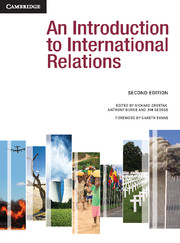Book contents
- Frontmatter
- Contents
- Tables, Figures and Boxes
- Contributors
- Preface and acknowledgements
- An Introduction to International Relations: The origins and changing agendas of a discipline
- 1 Theories of International Relations
- 2 The Traditional Agenda
- 9 The Modern State
- 10 Nations and Nationalism
- 11 Security
- 12 Arms Control
- 13 The Causes of War
- 14 The Changing Character of Warfare
- 15 The Ethics and Laws of War
- 16 International Law
- 17 International Society and European Expansion
- 18 Diplomacy
- 19 Great Powers
- 20 The Cold War
- 3 The New Agenda
- Glossary of Terms
- Bibliography
- Index
- References
13 - The Causes of War
from 2 - The Traditional Agenda
- Frontmatter
- Contents
- Tables, Figures and Boxes
- Contributors
- Preface and acknowledgements
- An Introduction to International Relations: The origins and changing agendas of a discipline
- 1 Theories of International Relations
- 2 The Traditional Agenda
- 9 The Modern State
- 10 Nations and Nationalism
- 11 Security
- 12 Arms Control
- 13 The Causes of War
- 14 The Changing Character of Warfare
- 15 The Ethics and Laws of War
- 16 International Law
- 17 International Society and European Expansion
- 18 Diplomacy
- 19 Great Powers
- 20 The Cold War
- 3 The New Agenda
- Glossary of Terms
- Bibliography
- Index
- References
Summary
Introduction
This chapter examines what causes war, focusing on war, or armed conflict, between sovereign states. The main part of this chapter is divided into the following four sections: ‘War, sovereignty and sociability’, ‘Necessary causes of war?’, ‘Regular causal paths to war?’, and ‘Contributory causes of war’. The last of these sections comprises three subsections, dealing with ‘Chance occurrences’, ‘War-conducive mechanisms’ and ‘Key actions and inactions’, which are three key ingredients of war-causation, combining in a variety of ways to produce concrete instances of war.
It should be noted at the outset that war has not always been regarded as a problem requiring serious scholarly attention to its causes. Strange or outrageous though it may seem, some people have held a benign, or positive, view of war. But especially through the experience of World War I, a contrary view which sees war in a negative way has become more dominant. Our interest in the causes of war, and the conditions of peace, is a reflection of this broad shift in our attitude towards war (Suganami 1996: 189–90). Since this shift was also a key factor in the formation of International Relations (IR) as an academic discipline, it is unsurprising to find that inquiry into the causes of war has been a traditional concern of that subject (see Introduction).
- Type
- Chapter
- Information
- An Introduction to International Relations , pp. 189 - 198Publisher: Cambridge University PressPrint publication year: 2011

